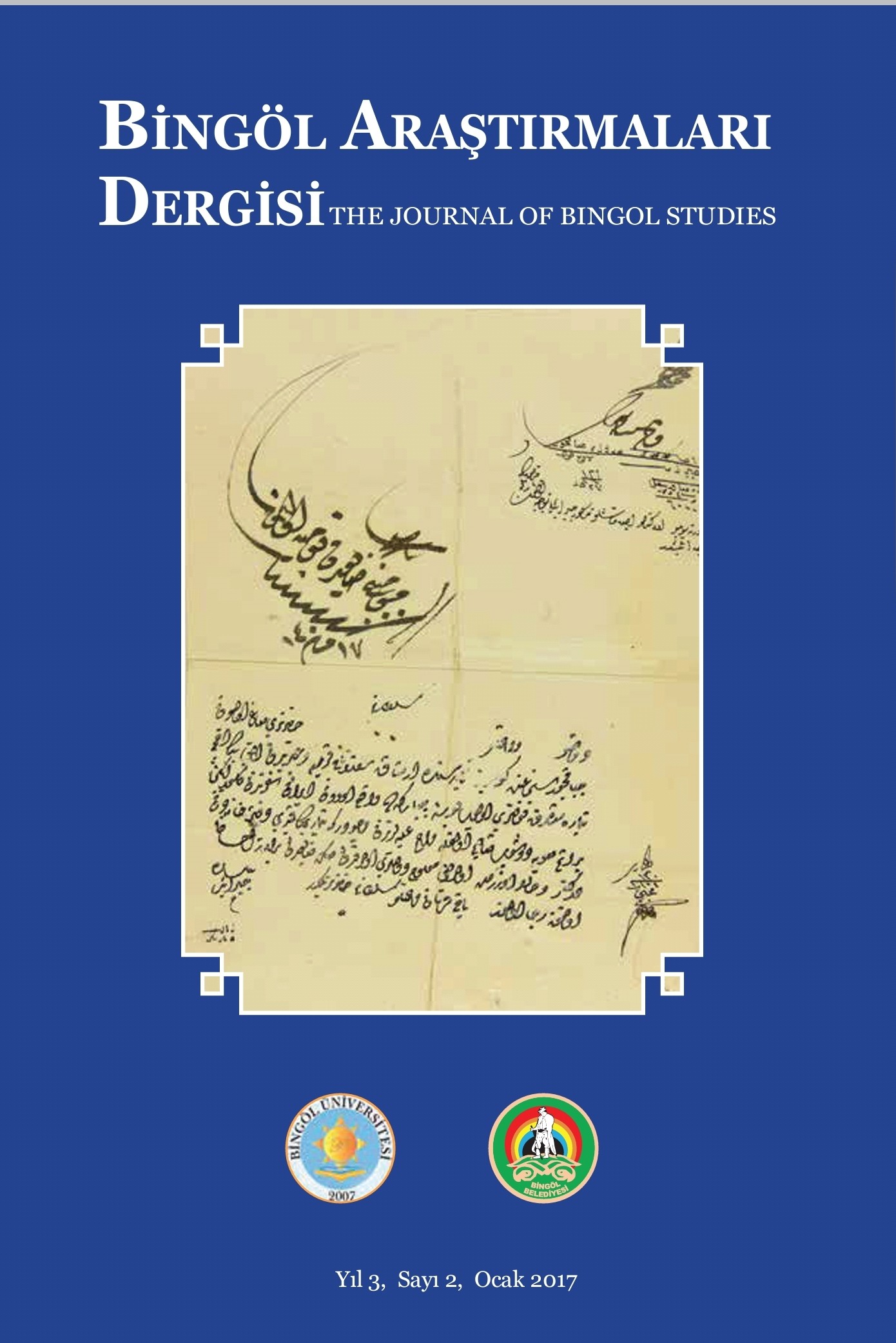İNGİLİZ RAPORLARINA GÖRE XX. YÜZYIL BAŞINDA BAĞDAT’IN TİCARET HACMİ (1900-1912)
Abbasiler döneminde Dicle nehri kıyısında inşa edilen Bağdat şehri, doğal ve beşeri faktörlerin etkisiyle stratejik olarak önemli bir konuma sahip olmuştur. Sahip olduğu özellikleri, şehri cazibe merkezi haline gelmesine ve bu sebeple her dönemde devletlerin hakimiyet mücadelelerine sahne olmuştur. XVI. yüzyılda Osmanlı hakimiyetine giren şehir, XX. yüzyıla kadar bu devletin sınırları içinde kalmıştır. Avrupalıların siyasi ve ekonomik yayılımlarının hız kazandığı XIX. yüzyılda rekabet, Ortadoğu coğrafyasına da sıçramış ve Avrupalı devletler kendilerine nüfuz alanı oluşturmak amacıyla ekonomik ve siyasi mücadeleye girmişlerdir. Bu dönemde Bağdat’ın stratejik önemi daha da artmaya başlamış ve İngilizler önem verdikleri Bağdat şehrinde kurdukları konsoloslukları aracılığıyla burayı hem siyasi hem de ekonomik faaliyetleri için bir üs merkezi olarak konumlandırmışlardır. Bu çalışmada, İngiltere’nin Bağdat’ta faaliyet gösteren konsolosluğunun 1900-1912 yılları arasında tutmuş olduğu ticaret raporları hakkında bilgi verilmek suretiyle tanıtımının yapılması hem de bu raporlardan hareketle Bağdat’ın XX. yüzyıl başında sahip olduğu ticaret hacmi ele alınması hedeflenmiştir.
Anahtar Kelimeler:
Osmanlı Devleti, İngiltere, Bağdat, Ticaret
The Trade Volume of Baghdad at the Beginning of the 20th Century According to British Reports (1900-1912)
The city of Baghdad, which was built on the banks of the Tigris river during the Abbasid period, had a strategically important position with the influence of natural and human factors. Its features have made the city a center of attraction, and for this reason, it has been the scene of states' domination struggles in every period. The city, which came under Ottoman rule in the 16th century, remained within the borders of this state until the 20th century. In the 19th century, when the political and economic expansion of the Europeans gained momentum, the competition spread to the Middle East geography and European states entered into an economic and political struggle in order to create a sphere of influence for themselves. During this period, the strategic importance of Baghdad began to increase and the British positioned it as a base for both their political and economic activities through their consulates they established in the city of Baghdad, which they valued. In this study, it is aimed to introduce the British consulate operating in Baghdad by giving information about the trade reports kept between 1900-1912 and at the same time to deal with the trade volume of Baghdad at the beginning of the 20th century, based on these reports.
Keywords:
Ottoman Empire, United Kingdom, Baghdad, Trade,
___
- Diplomatic and Consular Report: Trade of Baghdad, Foreing Office, Annual Series, No: 2884
- Diplomatic and Consular Report: Trade of Baghdad, Foreing Office, Annual Series, No: 3235
- Diplomatic and Consular Report: Trade of Baghdad, Foreing Office, Annual Series, No: 3477
- Diplomatic and Consular Report: Trade of Baghdad, Foreing Office, Annual Series, No: 3663
- Diplomatic and Consular Report: Trade of Baghdad, Foreing Office, Annual Series, No: 4073
- Diplomatic and Consular Report: Trade of Baghdad, Foreing Office, Annual Series, No: 4354
- Diplomatic and Consular Report: Trade of Baghdad, Foreing Office, Annual Series, No: 4482
- Diplomatic and Consular Report: Trade of Baghdad, Foreing Office, Annual Series, No: 4696
- Diplomatic and Consular Report: Trade of Baghdad, Foreing Office, Annual Series, No: 4999
- Diplomatic and Consular Report: Trade of Baghdad, Foreing Office, Annual Series, No: 5225
- AYBAR Celal, Osmanlı İmparatorluğu’nun Ticaret Muvazenesi 1878-1913, Zerbamat Basımevi, 1939
- EARLE, Edward Mead, Bağdat Demir ve Petrol Yolu Savaşı (1903-1923), Örgün Yayınevi, İstanbul, 2003
- ELDEM, Vedat, Osmanlı İmparatorluğu’nun İktisadi Şartları Hakkında Bir Tetkik, TTK, Ankara, 1994.
- GÜRAN, Tevfik, Resmî İstatistiklere Göre Osmanlı Toplum ve Ekonomisi, Türkiye İş Bankası Kültür Yayınları, İstanbul, 2017
- KUBAL, Ayfer Yazkan, Osmanlı-İngiliz İlişkileri ve Irak’ın Doğuşu, İlgi Kültür Sanat Yayınları, İstanbul 2018.
- Memâlik-i Osmanîye’nin 1325 Senesine Mahsus Ticaret-i Hariciye İstatistiki, Arşak Garuyan Matbaası, Dersaadet-1327 (İstanbul Üniversites Nadir Eserler Kütüphanesi, Demirbaş No: NEK4674).
- PAMUK, Şevket, “Osmanlı İmparatorluğu’nda Para 1326-1914”, Osmanlı İmparatorluğu’nun Ekonomik ve Sosyal Tarihi (Edt. Halil İnalcık ve Donald Quataert), C. 2, Eren Yayıncılık, İstanbul, 2004, s. 1053-1088.
- PAMUK, Şevket, 19. Yüzyılda Osmanlı Dış Ticareti, Tarihi İstatistikler Dizisi C. 1, Devlet İstatistik Enstitüsü Matbaası, Ankara, 1995
- PAMUK, Şevket, Osmanlı İmparatorluğu’nda Paranın Tarihi, Türkiye İş Bankası Kültür Yayınları, İstanbul, 2018.
- Ticaret-i Hariciye İstatistiki 1329, Matbaa-yı Osmaniye, Dersaadet-1331 (İstanbul Üniversitesi Nadir Eserler Kütüphanesi, Demirbaş No: NEK4674),
- YURDAKUL, Nurcan Özkaplan, İngiltere Ortadoğu’ya Nasıl Girdi?, Kronik Kitap, İstanbul 2018.
- YÜCE, Samet, Britanya’nın Ortadoğu Politikası ve Gertrude Bell, Nizamiye Akademi Yayınları, İstanbul 2018.
- ISSN: 1309-369X
- Yayın Aralığı: Yılda 2 Sayı
- Başlangıç: 2014
- Yayıncı: Bingöl Kültür ve Dayanışma Vakfı
Sayıdaki Diğer Makaleler
ÇAPAKÇUR KAZASI MÜDÜRÜ SÜLEYMAN BEY (1786-1873)
TÜRK KÜLTÜRÜNDE KOMŞULUK VE “KİTAB-I MÜSTAKİM”E GÖRE KOMŞULUĞUN ESASLARI
YÜKSEKÖĞRETİM ÖĞRENCİLERİNİN MEVLANA CELALEDDİN RUMİ’YE YAZDIKLARI 100 MEKTUBUN TEMATİK İNCELENMESİ
ÇOKKÜLTÜRLÜLÜK DENEYİMLERİ VE ALTERNATİF BİR MODEL OLARAK “HALAT KÜLTÜR”
ARICILIKTA TEKNOLOJİ KULLANIMINA YÖNELİK ÇALIŞMALARIN EĞİLİMİ
Mücahit ÇALIŞAN, Şener BALAT, Mehmet YAVUZ
FERİDUN FİKRİ DÜŞÜNSEL’İN TÜRKİYE BÜYÜK MİLLET MECLİSİ’NDEKİ FAALİYETLERİ (1939-1946)
İNGİLİZ RAPORLARINA GÖRE XX. YÜZYIL BAŞINDA BAĞDAT’IN TİCARET HACMİ (1900-1912)
